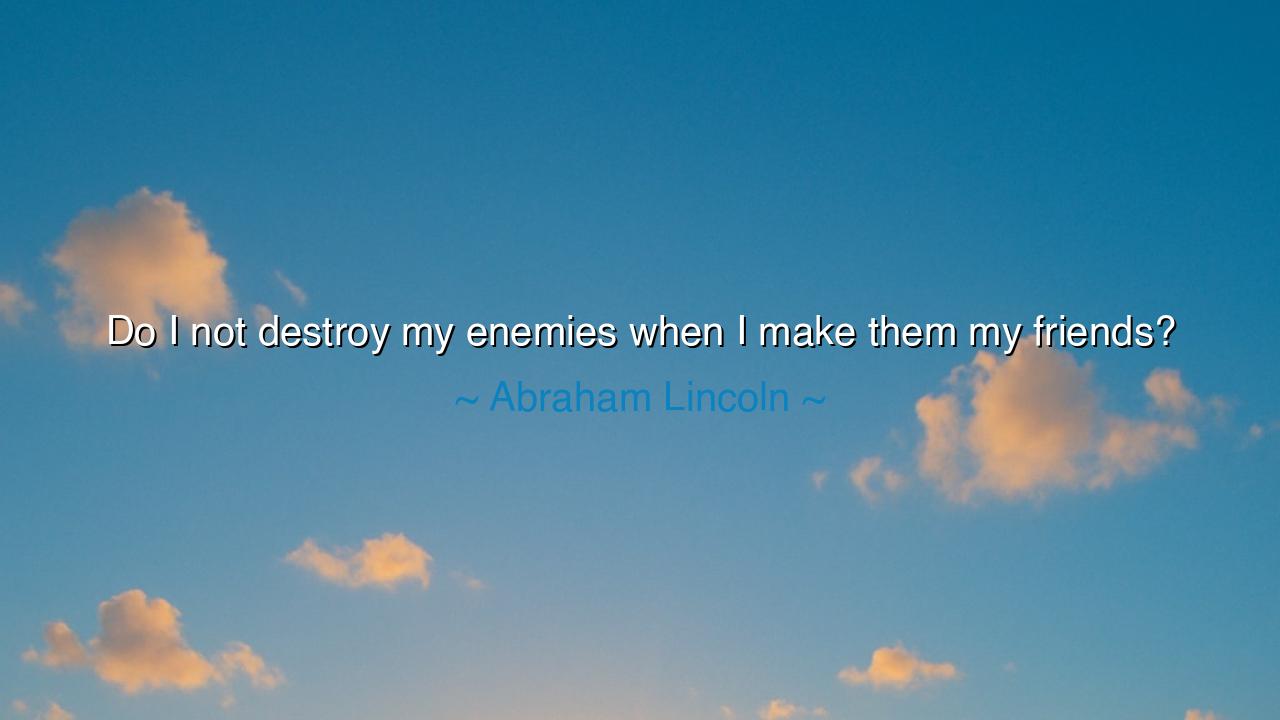
Do I not destroy my enemies when I make them my friends?






Abraham Lincoln, the great emancipator and the patient heart of a divided nation, once uttered a question so profound that it resounds across the ages: “Do I not destroy my enemies when I make them my friends?” In this single sentence lies a truth of such depth that it transforms the very idea of victory. For Lincoln, true conquest was not the crushing of one’s foes, but their transformation — not the silencing of opposition, but the awakening of understanding. He saw that hatred, when met with hatred, multiplies like fire fed by wind; but when hatred is met with compassion, it is extinguished at its source. Thus, he did not seek to destroy men, but enmity itself — and in doing so, he revealed that friendship is the mightiest weapon in the arsenal of the human soul.
The origin of this quote shines from the fires of Lincoln’s own life and the crucible of the American Civil War. He spoke these words not as a dreamer untouched by strife, but as a leader surrounded by division, betrayal, and bloodshed. His country was tearing itself apart, and yet he held within him the vision of a greater unity — a union not only of states, but of hearts. Lincoln’s wisdom was forged in sorrow; he knew the pain of mockery, the sting of enemies both within and without. Yet rather than hardening his heart, he tempered it. His belief was simple and radical: that to make peace, one must practice it; that the surest way to destroy an enemy is to turn him into a friend, for then both are freed — one from hatred, the other from fear.
In these words, Lincoln calls us to a higher form of strength — the strength of forgiveness. It is far easier to conquer an enemy by force than to embrace him with mercy. The warrior who strikes his foe wins a momentary victory; but the soul who redeems his foe wins a triumph eternal. When we make friends of those who once despised us, we dissolve the very root of conflict. This is the alchemy of the heart, turning bitterness into brotherhood. Lincoln knew that vengeance feeds upon itself, while reconciliation ends the cycle. Thus, to make friends of enemies is not weakness — it is divine courage.
History gives us many mirrors of this truth. When Nelson Mandela emerged from twenty-seven years of imprisonment under apartheid, he stood before a nation consumed by anger. He could have called for retribution, and the world would have justified it. Instead, he chose reconciliation. He invited his former jailers to his inauguration, and he spoke not of revenge but of unity. In that act of grace, he destroyed his enemies without lifting a hand — not by crushing them, but by transforming them. Like Lincoln, Mandela understood that to forgive is not to forget injustice, but to rise above it, to stand upon the higher ground where the spirit reigns over vengeance.
Lincoln’s question, gentle yet piercing, challenges every soul that seeks greatness. When he asks, “Do I not destroy my enemies when I make them my friends?”, he is inviting us to reflect on the nature of victory itself. What is it to win? Is it to break the body of another, or to heal the rift between hearts? The destroyer may command fear, but only the reconciler commands respect. The man who builds bridges where others build walls leaves a legacy that outlives empires. Thus, Lincoln teaches that the highest form of destruction is creation — the destruction of hostility through the creation of peace.
But let none mistake his compassion for softness. Lincoln was no stranger to the necessity of battle, for he waged war when justice demanded it. Yet even in war, he sought to preserve humanity. His words remind us that mercy is not the absence of strength, but its fulfillment. To forgive while holding power is to wield power wisely. The weak are cruel because they fear; the strong are kind because they understand. Lincoln’s greatness lay not only in his resolve, but in his refusal to let hatred corrupt his soul.
So, my children of wisdom, remember this lesson: the surest way to destroy your enemies is to love them. Not with blind naivety, but with the clarity of spirit that sees beyond the battle. When someone wrongs you, respond not with wrath but with restraint. Seek to understand rather than to wound. This is not the easy path — it is the path of the strong, the patient, the wise. Each time you answer hatred with kindness, you rob it of its power. Each time you offer peace where others expect vengeance, you become a conqueror of a greater kind.
For in the end, as Lincoln knew, victory is not written in the defeat of others, but in the triumph of the human heart. The empire of friendship lasts where kingdoms of anger fall. When you make your enemies your friends, you have destroyed not only hostility, but the very idea of enmity itself. And in that destruction lies the birth of a better world — one where the weapons of war are laid down, and the hands once raised in violence are extended in peace.






AAdministratorAdministrator
Welcome, honored guests. Please leave a comment, we will respond soon